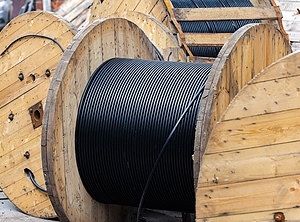PERSTORP
Renewable version of PVC plasticiser introduced
 Perstorp says its “Emoltene 100” range substantially extends the life of outdoor PVC applications such as cables and roofing membrane (Photo: PantherMedia/VERSUSstudio) |
Swedish speciality chemicals company Perstorp (Malmö; www.perstorp.com) has introduced a general-purpose PVC plasticiser partly based on biogas, which replaces fossil-based natural gas as a raw material.
Its “Emoltene 100 Pro” is a dipropylheptyl phthalate (DPHP) that can be dropped straight into existing flexible PVC formulations and has the same performance as its “Emoltene 100” plasticiser, Perstorp said. Emoltene 100 Pro will be available in two grades, with differing levels of renewable content based on mass balance. The first, containing 14% renewable content, is available now, while the second with 71% renewable raw material is expected to be available in the near future.
Perstorp launched the original Emoltene 100 plasticiser in 2009. Since then, it has proved its performance in terms of durability and flexibility, especially for tough outdoor applications, said business manager Martin Hansson. “This track record drove us to keep working with the same DPHP molecule, but to give it a more sustainable design, in line with our customers’ demands as well as global sustainability trends in, for example, the automotive and construction industries,” commented Hansson. “Being able to offer a well-known and proven plasticizer with improved environmental properties is an important milestone in future-proofing soft PVC applications.”
Emoltene 100 Pro, as well as all Perstorp “Pro-Environment” products are ISCC Plus certified, both for mass balance and greenhouse gas calculations. The company said it has significantly expanded its Pro-Environment portfolio in the past few years, introducing products such as polyols, de-icers, plasticisers, acids, aldehydes and alcohols that are made from renewable and/or recycled raw materials.
In July 2019, the Swedish firm launched a renewable grade of its “Pevalen” polyol ester non-phthalate plasticizer (see Plasteurope.com of 10.07.2019).
Its “Emoltene 100 Pro” is a dipropylheptyl phthalate (DPHP) that can be dropped straight into existing flexible PVC formulations and has the same performance as its “Emoltene 100” plasticiser, Perstorp said. Emoltene 100 Pro will be available in two grades, with differing levels of renewable content based on mass balance. The first, containing 14% renewable content, is available now, while the second with 71% renewable raw material is expected to be available in the near future.
Perstorp launched the original Emoltene 100 plasticiser in 2009. Since then, it has proved its performance in terms of durability and flexibility, especially for tough outdoor applications, said business manager Martin Hansson. “This track record drove us to keep working with the same DPHP molecule, but to give it a more sustainable design, in line with our customers’ demands as well as global sustainability trends in, for example, the automotive and construction industries,” commented Hansson. “Being able to offer a well-known and proven plasticizer with improved environmental properties is an important milestone in future-proofing soft PVC applications.”
Emoltene 100 Pro, as well as all Perstorp “Pro-Environment” products are ISCC Plus certified, both for mass balance and greenhouse gas calculations. The company said it has significantly expanded its Pro-Environment portfolio in the past few years, introducing products such as polyols, de-icers, plasticisers, acids, aldehydes and alcohols that are made from renewable and/or recycled raw materials.
In July 2019, the Swedish firm launched a renewable grade of its “Pevalen” polyol ester non-phthalate plasticizer (see Plasteurope.com of 10.07.2019).
20.05.2021 Plasteurope.com [247667-0]
Published on 20.05.2021
